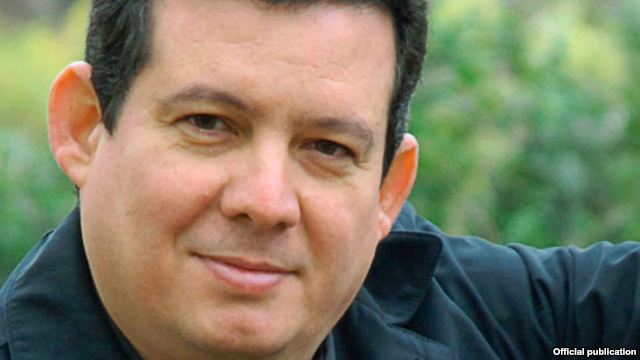 Amir Valle in a photo by Anna Weisse published on the writer’s web page.
Amir Valle in a photo by Anna Weisse published on the writer’s web page.
After being denied the Casa de las Americas award by the irreverence of his work, Habana Babilonia, the Dark Side of Prostitution, Amir Valle received an award that made up for any censorship: more than 5,000 messages from underground readers celebrating his book in testimonials.
“Someone from the Casa of the Americas stole a copy and evidently posted it on the Internet. I never put a copy of it anywhere. From then on, people I had never met began to write me, and they started to read me backwards, because I was like a kind of myth,” Valle remembers, on the program 1800 Online, of Radio Marti.
“That pleased me a lot,” revealed the author, “because all the censorship I got with the book was compensated for, the fact that people thanked me and sent signs that they were with me and that it was a necessary book.” From that moment, the fact that they had wanted to silence him converted him into a “writer who was read.”
As if predestined to live a nomadic life, Amir was born in Guantanamo and remained until he was 11 years old in Central Antonio Maceo, in Holguin. Later he moved with his family to Santiago de Cuba, where he took his first two years of Journalism, finishing his degree in Havana. Later, he moved to Cienfuegos to do his social service.
For many years his narratives, which had an intimate edge, were accepted and celebrated, in such a way that he won the most important literary prizes in Cuba, but when he took a step toward more critical literature, the “encounters” began, including with writer-friends in power, charged with ensuring political correctness.
He realized that “liberty has its limits, above all when I started to use the word ’liberty’,” and his rebellion ended in exile. In 2004 he visited Spain for professional reasons, and never again was he permitted to return to Cuba.
Again circumstances obliged him to change his home. In 2006, a German foundation, which protected persecuted writers, awarded him a scholarship and a residence. His wife and son joined him in exile, but not before the government withheld permission from them to leave for two years.
“Living in exile has allowed me to exercise this liberty with more ease, to say what i think, to ally myself with none of the extremes and to continue being a citizen of any place in the world,” observes the author of 20-some titles, in the fields of narrative, journalism, essay and literary criticism.
At present he manages the Hispanic Culture Review, Otro Lunes,(Another Monday) and is putting the final touches on a novel about his exile, entitled No hay hormigas en la nieve (There are no ants in snow). “After the big trauma I experienced upon leaving Cuba, when they banned me from returning, for a long time I couldn’t write one line about it; I tried and couldn’t do it. I had a very strong inner block, but after a couple of years I felt I could do it, and a complete chapter came out.”
The plot of the novel tells the stories of five Cubans who emigrate to Germany at distinct times. In addition to his own story, he tells that of a black violinist in Germany, Brindis de Salas, in the second half of the nineteenth century, and that of a young man who tries to cross the German border and is imprisoned by the STASI, who today works as a tourist guide in the then prison of this organ of German intelligence.
Having lived it in his own skin, and by way of thanking those authors both read and unknown who opened his eyes to thinking differently, Valle is a defender of writers who are persecuted in Cuba.
His most recent cause is freedom for the writer Angel Santiesteban, who he defines as “a great writer of my generation on the island,” in addition to being “a good friend, a brother,” with whom he shared adventures when they were both 16 years old. In his blog, loyal to the truth and free to tell it, he gives a strong criticism of those who know about the innocence of Santiesteban and remain silent.
Published in Martí Noticias .
Translated by Regina Anavy
February 14 2013
